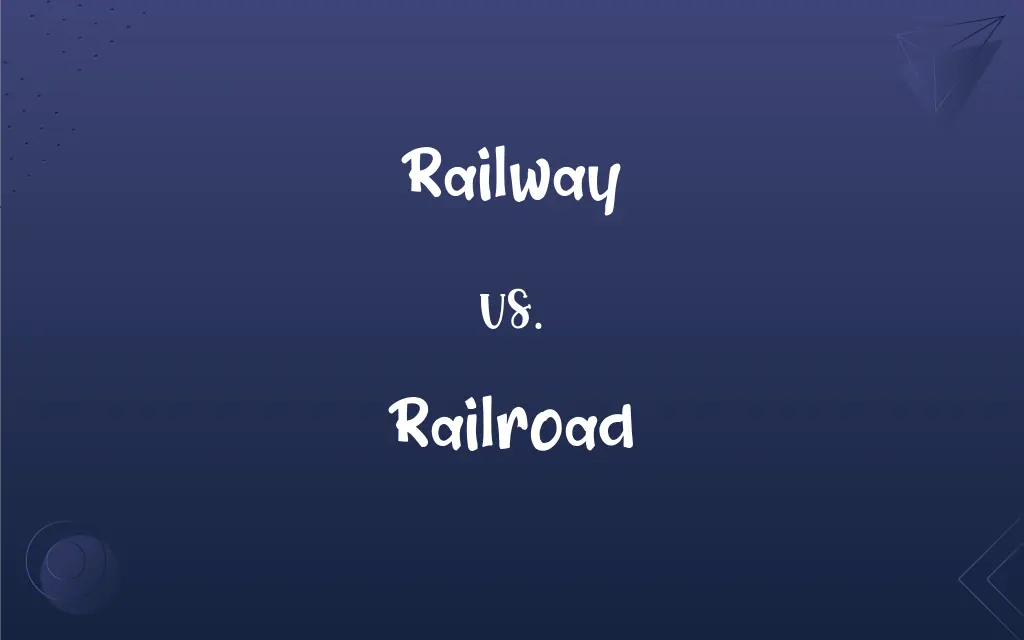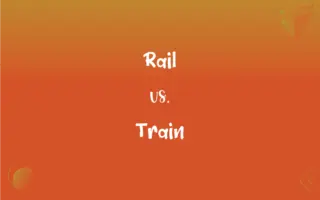Railway vs. Railroad: What's the Difference?
Edited by Aimie Carlson || By Harlon Moss || Updated on October 4, 2023
Railway and railroad both refer to tracks for trains, but "railway" is more common in British English and "railroad" in American English.

Key Differences
Railway and railroad are terms that describe a system of tracks on which trains run. While essentially referring to the same infrastructure, the preference in terminology is often tied to regional distinctions. "Railway" is predominantly used in British English and many other parts of the world. It encompasses not just the tracks but also the operations, vehicles, and systems associated with train transportation. In contrast, "railroad" is the term preferred in American English. It has the same implications, covering both the physical tracks and the broader system of train transportation.
Diving deeper into linguistic preferences, "railway" is often found in the names of many train operations in countries like the UK, India, and Australia. Terms like "railway station" are more prevalent in these regions. In the U.S., however, one would more commonly hear "railroad tracks" or "railroad station."
It's worth noting that despite these regional preferences, the meaning remains consistent across both terms. Both railway and railroad denote a mode of land transport in which flanged-wheeled vehicles move along two parallel rails.
In modern contexts, especially in international communication, it's not unusual to encounter both terms interchangeably. While purists might stick to the regional preferences, the globalized world has led to a blending of terminologies.
Comparison Chart
Origin
British English
American English
ADVERTISEMENT
Usage
Preferred in UK, India, Australia, etc.
Preferred in the USA
Incorporation
Found in names like "British Railways"
Found in names like "Union Pacific Railroad"
Stations
Often referred to as "railway stations"
Often referred to as "railroad stations"
Context
Encompasses tracks, operations, vehicles, and systems
Similar encompassing but with American linguistic preference
Railway and Railroad Definitions
Railway
Railway refers to a system of tracks for train transportation.
The railway extends across the entire country.
ADVERTISEMENT
Railroad
Railroad is a network of tracks on which trains run.
The transcontinental railroad changed American history.
Railway
Railway systems have played a pivotal role in industrialization.
The expansion of the railway contributed to the city's growth.
Railroad
Railroad companies manage train operations in the U.S.
The local railroad announced a delay due to maintenance.
Railway
Railways can be for passenger or freight transport.
The freight railway transports goods across states.
Railroad
Railroads have shaped the American landscape and economy.
The gold rush saw railroads expand rapidly westward.
Railway
Railway is a term predominantly used in British English.
The London Underground is a famous railway.
Railroad
Railroads can be elevated, underground, or at ground level.
The city's elevated railroad offers stunning views.
Railway
Railway can denote the company operating the trains.
The national railway announced new routes today.
Railroad
Railroad is the preferred term in American English.
The railroad station is a few blocks away.
Railway
A railroad, especially one operated over a limited area
A commuter railway.
Railroad
A road composed of parallel steel rails supported by ties and providing a track for locomotive-drawn trains or other wheeled vehicles.
Railway
A track providing a runway for wheeled equipment.
Railroad
A system of railroad track, together with the land, stations, rolling stock, and other related property under one management.
Railway
A transport system using rails used to move passengers or goods.
Railroad
To transport by railroad.
FAQs
What does railway mean?
Railway refers to a system of tracks on which trains run, along with associated operations and services.
Can the terms railway and railroad be used interchangeably?
Generally, yes, though it depends on the regional audience and context.
Which term appears more in global contexts?
Both terms are used, but "railway" might be more recognized internationally.
Are there famous railways known worldwide?
Yes, like the Trans-Siberian Railway or the Orient Express.
What's the difference between a subway and a railroad?
A subway is a specific type of railway or railroad that runs underground, typically in urban areas.
Do countries have regulatory bodies for railroads?
Yes, many countries have agencies that oversee and regulate railroad operations.
Are there notable novels centered on railroads or railways?
Yes, books like "Atlas Shrugged" prominently feature railroads.
Can the word railway refer to the organization operating the trains?
Yes, "railway" can refer to both the tracks and the operating entity.
Why did railroads become iconic symbols of the American West?
Railroads symbolize westward expansion, connectivity, and the Industrial Revolution in the U.S.
Is the word railroad used outside of the U.S.?
While predominant in the U.S., "railroad" can be understood and is occasionally used elsewhere.
Were railroads crucial in the American Civil War?
Yes, railroads were vital for troop and supply movements during the Civil War.
How have railways evolved over time?
Railways have seen advancements in speed, safety, technology, and infrastructure.
Which term is older, railway or railroad?
Both terms have roots in the early 19th century, but "railway" predates "railroad" slightly in English literature.
Which countries primarily use the term railway?
Countries like the UK, India, and Australia predominantly use "railway."
Are railroads significant in American history?
Yes, railroads played a crucial role in America's westward expansion and industrial growth.
Can both passenger and cargo trains run on a railway or railroad?
Yes, both types of trains can operate on either.
How do railways contribute to urban development?
Railways can stimulate growth by improving connectivity and transportation infrastructure.
Is railroad the same as railway?
Essentially, yes, though "railroad" is preferred in American English and "railway" in British English.
What's a common term for a train station in the U.S.?
In the U.S., it's often referred to as a "railroad station."
How do railways impact economies?
Railways facilitate trade, transportation, and connectivity, stimulating economic growth.
About Author
Written by
Harlon MossHarlon is a seasoned quality moderator and accomplished content writer for Difference Wiki. An alumnus of the prestigious University of California, he earned his degree in Computer Science. Leveraging his academic background, Harlon brings a meticulous and informed perspective to his work, ensuring content accuracy and excellence.
Edited by
Aimie CarlsonAimie Carlson, holding a master's degree in English literature, is a fervent English language enthusiast. She lends her writing talents to Difference Wiki, a prominent website that specializes in comparisons, offering readers insightful analyses that both captivate and inform.































































